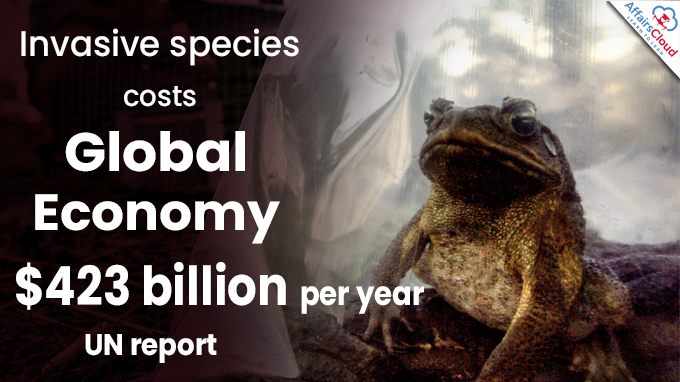 The Intergovernmental Science-Policy Platform on Biodiversity and Ecosystem Services (IPBES), the leading United Nations (UN) body on Biodiversity and Conservation, published a report titled Assessment Report on Invasive Alien Species and their Control (known as the “Invasive Alien Species Report”).
The Intergovernmental Science-Policy Platform on Biodiversity and Ecosystem Services (IPBES), the leading United Nations (UN) body on Biodiversity and Conservation, published a report titled Assessment Report on Invasive Alien Species and their Control (known as the “Invasive Alien Species Report”).
- As per the report, invasive alien species were identified as one of the main direct drivers of biodiversity loss worldwide, and at least 37,000 alien species were established worldwide.
- The report also reveals that more than 3,500 invasive species have penetrated various regions and biomes worldwide due to human activities, thus affecting human health, food security, and biodiversity.
- The global economic cost of invasive alien species exceeded USD 423 billion annually in 2019, with costs having at least quadrupled every decade since 1970.
Background:
i.In 2018, the IPBES Plenary, at its 6th session (IPBES-6) in Medellin, Colombia, approved the undertaking of a thematic assessment of invasive alien species and their control.
ii.The assessment officially commenced at the 7th session of the IPBES Plenary (IPBES-7) in Paris (France) in 2019.
iii.The assessment report and its summary for policymakers for its approval were presented for the Plenary’s acceptance, at the 10th session of the Plenary (IPBES-10).
- IPBES-10 took place from 28 August – 2 September 2023 in Bonn, Germany.
Report Analysis:
i.The report emphasised that not all alien species become invasive, Invasive alien species are a specific subset of alien species that establish and spread, causing harm to ecosystems and sometimes people.
- About 6% of alien plants; 22% of alien invertebrates; 14% of alien vertebrates; and 11% of alien microbes are known to be invasive, posing major risks to nature and to people.
ii.Invasive alien species have a profound impact on ecosystems worldwide, contributing to 60% of global animal and plant extinctions. In some cases, they are the sole drivers, responsible for 16% of these extinctions.
- Over 218 invasive alien species have been directly responsible for more than 1,200 local extinctions.
iii.Nearly 80% of the documented impacts of invasive alien species on nature’s contributions to people are negative, especially through damage to food supplies.
Examples:
- The impact of the European shore crab (Carcinus maenas) on commercial shellfish beds in New England, the United Kingdom (UK);
- Damage caused by the Caribbean false mussel (Mytilopsis sallei) to locally important fishery resources in India.
Recent Related News:
According to the new report titled “Falling short: Addressing the climate finance gap for children” released on 22nd June 2023, by the members of the Children’s Environmental Rights Initiative (CERI) coalition; Plan International, Save the Children, and United Nations Children’s Fund(UNICEF), despite bearing the impacts of the climate crisis, children are being failed by climate funding commitments.
About Intergovernmental Science-Policy Platform on Biodiversity and Ecosystem Services (IPBES):
Executive secretary– Dr. Anne Larigauderie
Headquarters– Bonn, Germany
Established on– 2012




